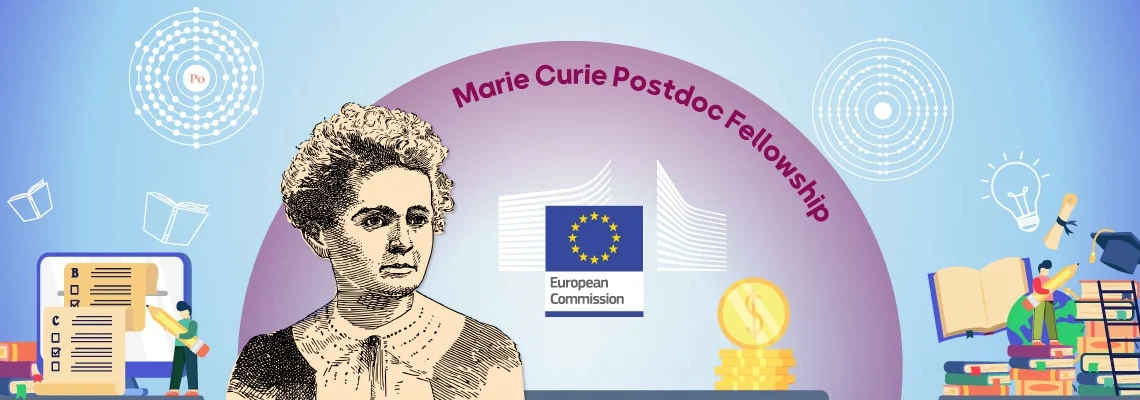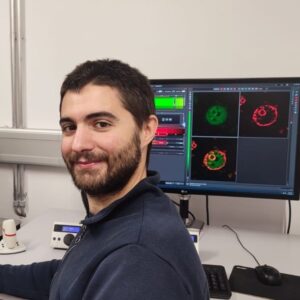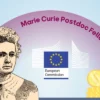
Marie Curie Postdoc Fellowship stands out as a widely sought-after grant offered to emerging researchers following the completion of their PhD. Within the framework of the Marie Skłodowska-Curie Actions (MSCA), i.e., a funding program of the European Union (EU), diverse grants are available. These grants support researchers at various career stages, encompassing PhD students through initiatives like the Marie Curie PhD Scholarship and early-stage researchers through the Marie Curie postdoctoral fellowship opportunities. Funded by the European Commission, the MSCA operates under the Horizon 2020 program, the predecessor to Horizon Europe, the current EU research and innovation program.
Marie Curie Postdoctoral Fellowship
Different Types of Marie Curie Fellowship
The Marie Curie Postdoctoral Fellowship opportunities are part of the broader MSCA program. This program aims to promote international mobility and maximize career development for postdoctoral fellows. These fellowships are targeted at postdoctoral researchers and provide opportunities for them to enhance their skills and broaden their research experience. There are different types of Marie Curie postdoctoral fellowships within the MSCA framework, including:
Individual Fellowships (IF)
The IFs are intended to assist seasoned researchers of any nationality who want to relocate abroad to conduct research. The objective of offering chances for advanced training, interdisciplinary collaboration, and international mobility is to improve the researcher’s abilities, expertise, and career prospects. By enabling researchers to work in prestigious universities, research facilities, or private sector businesses, the fellowship promotes innovation and knowledge sharing in their area of specialization.
Global Fellowships (GF)
By allowing researchers to conduct their work outside of Europe, the GFs guarantee global exposure and promote cooperation with organizations across the globe. During the transnational outgoing phase of this fellowship, the researcher spends one to two years working for a host organization in a non-European nation. Following this phase, the researcher must return to a European host institution for at least one year of reintegration. While keeping close ties with the European research community, this structure supports researchers in gaining various experiences, creating international networks, and advancing research excellence.
European Fellowships (EF)
Researchers who relocate within Europe or from outside of Europe to an EU Member State or an Associated Country can receive funding through the EFs. By enabling researchers to work with prestigious institutions, gain access to top-notch research facilities, and broaden their expertise in a new academic or industrial setting, these fellowships aid in the development of careers. These fellowships, which usually last 12 to 24 months, give researchers access to specialized training, networking opportunities, and mentorship, all of which contribute to developing Europe’s research and innovation environment.
Countries Covered
Marie Curie Fellowship is open to researchers worldwide, offering an excellent opportunity to advance their careers. The program encourages international, interdisciplinary, and intersectoral mobility, enabling researchers to gain experience in different countries, sectors, and disciplines. It promotes collaboration between academia, industry, and other non-academic sectors, ensuring researchers develop diverse skills and contribute to cutting-edge innovation. Eligible candidates can apply for fellowships to carry out projects in EU Member States or Associated Countries.
Stipend for Postdoc Researchers
The stipend for the Marie Curie Postdoc Fellowship varies depending on several factors, including the type of fellowship, the researcher’s experience, and the host country. The Marie Curie Postdoc Fellowship stipend typically covers the researcher’s salary, mobility allowance, and family allowance (if applicable). The amounts are designed to ensure a competitive salary that allows researchers to focus on their research without financial concerns. It’s crucial to check the latest guidelines and specific details on the official MSCA website or the Horizon Europe portal for the most accurate and up-to-date information on the program, including eligibility criteria, application procedures, and financial aspects.
This article will walk you through a real, inspirational, and encouraging story of the journey an Italian scientist had throughout the Marie Curie Postdoc Fellowship application process from the beginning until they won the grant.
Andrea Belluati, Winner of a Marie Curie Postdoc Fellowship 2021

This transition marked a pivotal point in my trajectory, culminating in completing the PhD program in 2020. This achievement set the stage for my pursuit of postdoctoral opportunities, merging my background in biotechnology with my expertise in physical chemistry. During my PhD, I knew I wanted to further develop my research, focusing more on polymer synthesis and the use of enzymes for sustainable production. From my time in Switzerland, I already knew the supervisor I wanted to do my postdoc with, Prof. Nico Bruns, and he was happy to help me secure the MSCA IF.
Individual funding sources, grants, and fellowships
In the final year of my PhD, armed with a clearer vision of my research interests and career goals, I began the arduous task of applying for individual funding. This phase was a true test of patience and resilience. My first two attempts were with the SNSF (Swiss National Science Foundation) mobility grant. As the name implies, international mobility is fundamental in this scheme, and it was just fine, as my prospective supervisor had just moved to the UK. The application process was rigorous and demanding, requiring a detailed proposal, a well-thought-out research plan, and strong letters of recommendation. Despite my efforts, the outcome was not favorable.
My Marie Curie Fellowship Application
With resilience and determination, I applied for the MSCA Individual Postdoc Fellowship. The Marie Curie Fellowship is renowned for its competitive selection process, focusing on the research’s excellence and the researcher’s potential. I submitted the same project proposal, refining it with insights from my previous application’s feedback. To my delight, I was successful on my first attempt. The wait for the results was nerve-wracking, but in February 2021, I received the life-changing news – I had been selected as the first-ranked candidate for the Marie Curie IF Fellowship. This moment was a culmination of my efforts, symbolizing a victory over personal and professional challenges.
Role of Academic Supervisors
Reflecting, I realize the crucial role my academic supervisor played in this journey. They were more than just a guide; they were a mentor who believed in my potential. A good mentor provides intellectual guidance, and emotional support, and helps navigate the often-complex academic landscape. They invest in you, not just for your PhD or postdoc tenure but for your overall career trajectory. This relationship, built on mutual respect and shared intellectual curiosity, is the cornerstone of a successful academic career.
Last Words
Overall, the Marie Curie Fellowship is crucial in strengthening the global research community. It widely helps global scientists to advance their careers while making significant contributions to their respective research fields.



5 Comments
Marie Curie PhD Scholarship – Inspiring Stories | Applyindex
3 weeks ago[…] up our goals and dreams in life because the impossible is not impossible. My next goal is to win a Marie Curie Postdoc Fellowship. ‘Says […]
Find a Supervisor – A Comprehensive Guide 2025 | Applyindex
3 weeks ago[…] scenario is if you plan to apply for postdoctoral grants and fellowships, such as the Marie Curie Postdoctoral Fellowships in Europe, the Banting Postdoctoral Fellowships in Canada, or the Melbourne Postdoctoral […]
Beyond Graduation: Maximizing Chances with Postdoctoral Fellowship | Applyindex
3 weeks ago[…] Early Career Researcher Award (DECRA) is Australia’s most popular governmental postdoc grant. Marie Curie Postdoc Fellowship is the most popular one in […]
Beyond Graduation: Maximizing Opportunities with a Postdoctoral Fellowship | Applyindex
1 month ago[…] Early Career Researcher Award (DECRA) is Australia’s most popular governmental postdoc grant. Marie Curie Postdoc Fellowships are the most popular ones in […]
Should I Find a Supervisor? | Applyindex
2 months ago[…] scenario is if you are planning to apply for postdoctoral grants and fellowships, such as the Marie Curie Postdoctoral Fellowships in Europe, the Banting Postdoctoral Fellowships in Canada, or the Melbourne Postdoctoral […]